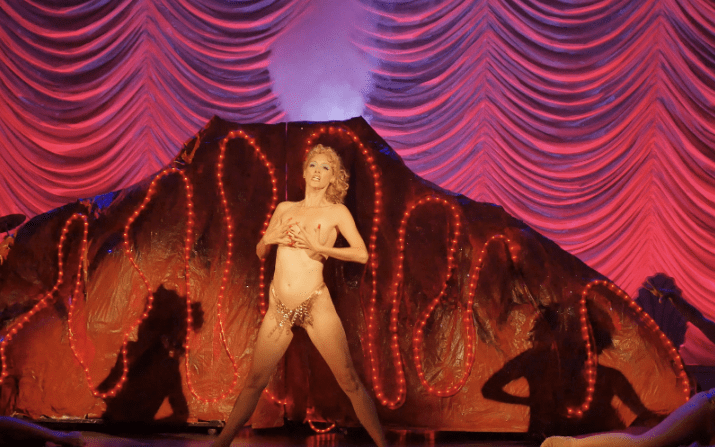
When director Paul Verhoeven’s Showgirls hit theaters in 1995, it was a critical and commercial disaster. A parable about showbiz told through the lens of Las Vegas strippers, the NC-17 film essentially ended its star and Saved by the Bell alum, Elizabeth Berkley’s career and exiled Verhoeven from Hollywood for the next two decades.
However, not long after its release, the film started to pick up a cult following and today, some consider it a camp masterpiece—complete with parody drag shows and Rocky Horror Picture Show-esque shadow casts. Director Jeffrey McHale’s new documentary, You Don’t Nomi, which premiered tonight at Tribeca, tries to examine that complex legacy and in the process delivers a smart, well-made crowd-pleaser that is absolutely one of the best movies at the festival.
Assembled from archival footage, film clips from both Showgirls and other films and interviews with various fans and cultural critics–though nobody directly associated with the movie–the result is like a scholarly essay put to film. That may sound boring, but McHale keeps things interesting in two major ways.
The first is the film clips he uses. While we see scenes and moments from Showgirls itself, McHale also takes a cue from an interviewee, who says Verhoeven’s filmography provides a “framework” to really understanding the movie. When an interviewee talks about the scene where Berkley’s Nomi pukes, McHale intercuts scenes from 1997’s Starship Troopers and 2012’s Tricked to illustrate the point. While that technique is one of McHale’s most convincing, he perhaps employs it best when using clips of non-Verhoeven films.
Take the segment where an interviewee describes a reviewer who became obsessed with actress Maria Montez’s performance in 1944’s Cobra Woman because of how her commitment to the material turned it into glorious camp. As we watch scenes of Montez in the film’s infamous snake dance scene, McHale edits in shots of Berkley’s Nomi dancing on a stage with a fake volcano and other mostly nude dancers. It’s a striking moment and one that helps the film’s goal of reexamining Berkley’s performance. As David Schmader, who does annotated screenings of the film puts it, as Berkley plays her, Nomi’s wild mood swings can be summed up as, “why touch something you can kick?”
There and throughout, the interviews McHale includes are often what make his film so enjoyable—even if the fact that he never shows a talking head makes it a little difficult to keep track of who’s talking at any given moment. Regardless, while it’s safe to assume McHale likes Showgirls considering he directed, produced, wrote and edited a film about it, what makes his film so accessible to a wide audience is that the interviews he includes make the case both for and against the film.
When it comes to negative readings of the film, moments where former San Francisco Examiner critic, Barbara Shulgasser-Parker calls the film merely, “watchable,” are fun, but journalist Haley Mlotek offers the most convincing arguments for the film’s badness. Throughout, Mlotek condemns Verhoeven’s habit of tricking or convincing his actresses into giving him the performances he wants and it feels nauseating post-#MeToo. Her criticism is especially harsh toward one of Showgirls‘ final scenes, in which Nomi beats up her best friend’s rapist. As Mlotek explains it, both Nomi’s exploitation of her sexuality and her desire to revenge violence with more violence feel overtly male to her. It’s a fair point and one that makes sense given Mlotek’s reading of the film throughout, but McHale immediately offers a counterpoint through an interview with actress, April Kidwell.
After arriving in New York City with a wide-eyed optimism Kidwell herself likens to Nomi’s, she states that she fell into a deep depression after a man at her job drugged and raped her. To Kidwell, who played Berkley’s characters in musicals of both Saved by the Bell and Showgirls, she says that singing the song about that moment in the latter show gives her, “therapeutic, cathartic joy.” While the horror of Kidwell’s experience predisposes us to favor her reading, it’s important that McHale includes both moments, thereby by allowing the audience to see all possible perspectives on Verhoeven’s film.
That said, McHale’s film will probably work best for those who are already fans of Showgirls or film nerds who enjoy any deep dive into a film with lots to unpack. However, in making a film so fun, accessible and fair to its subject, it’s hard to imagine anyone walking out without finding something to enjoy. Like the film it examines, You Don’t Nomi is at turns silly, raunchy and serious and whatever your opinion on Showgirls, there has to be something to it if it inspires a film this good.

